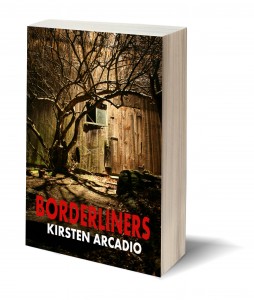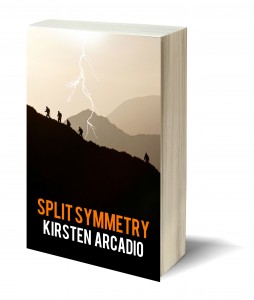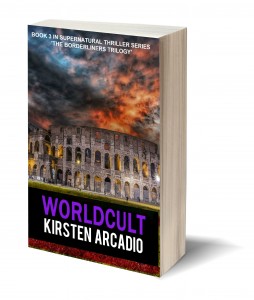Whilst writing my most recent novel, Split Symmetry, I listened constantly to music. In fact, I found I was unable to write a single word without music on in the background.
I used music to inject creativity into all aspects of the book, starting with the characters and ending with the main themes of love, survival, free will and reality. Often I used it to help me pace up or down, or write in a certain style. For example, if I wanted to write a contemplative, poetic passage, I would listen to a downtempo, ambient track, and if I needed to write action scenes, I deliberately chose tracks with a fast beat. Most of all, I found music helped my mind operate outside of the constraints of normal life. With music, I could make hitherto elusive connections between themes and characters, feel the true mood of the emotions I was trying to convey and find true synthesis in the language I was using.
Soundtrack by: Coldplay, Ulrich Schnauss, Portishead, H.U.V.A. Network, Mystical Sun and Under the Radar.
Character building
When my characters have pieces of music or particular bands and sounds attached to them, it doesn’t happen on purpose. Rather, it’s something I leave to chance. During the writing of Split Symmetry, a central character named Philip became linked to Coldplay’s ‘White Shadows’. The character is central to the idea of reality and irreality in the book, and I was drawn the idea of shadows being turned inside out, just as the reality around him became turned inside out. In fact, one of the other characters sees a strange white-shadowed effect around him, like a halo, towards the start of the book. I attribute that image directly to Coldplay.
Love
Love is not straightforward in Split Symmetry. The protagonist, Elena, is in love but she doesn’t know it yet. Her feelings are buried deep inside, confused and tied up with her own unwillingness to get involved with anyone, let alone a former patient of her psychotherapy practice, (which is what she finds happening to her). In order to express these complex feelings, I listened to a number of melancholy love songs – for what good love song isn’t? And I explored the multi-layered textures of these tracks to help get across the conflicting nature of emotion.
Glory Box (Portishead): This was a favourite of mine, as it really gets to the heart of the push and pull of an ambiguous relationship. I felt it echoed how my protagonist, Elena, feels for her psychotherapy patient, James, as she is cautious but at the same time desperate to let go of the limitations to her relationship with him. Featuring the voice of Beth Gibbons, this is a superb track that resonates with suppressed emotion.
Crazy for you (Slowdive, Ulrich Schnauss rework): The idea of unrequited love between the two main protagonists, James and Elena, was uppermost in my mind whilst listening to this track, and its melancholy, mysterious air captures the feeling I wanted to work into their relationship.
Fate and free will
In order to explore fate and free will in my novel, I chose the multiverse theory, which also gives the whole story a metaphysical, almost supernatural feel. By some it would be described as science fiction. To get into the feeling of other-worldliness mixed with metaphysics and science I listened to a lot of electronica and ambient music, often using a stream of consciousness-type state whilst listening to Digitally Imported, an online music channel that plays different types of ambient, chill and electronic tunes.
Eastern Traditions and philosophies were key to the development of some of my themes. I read a book called ‘The Tao of Quantum Physics’ (by Fritjof Capra) and was interested in the idea of a link between the Hindu tradition and quantum mechanics.
Zenigma (Under the Radar) brought to mind this link. The track fades in and builds up with a simple one chord arrangement which gradually builds up to a feeling of mystery then emphasised by the haunting female vocals that come in towards the middle. Whilst I listened to the track over and over again, I thought: what if the ancients understood ideas about eternal and parallel realities which are only now being proposed by quantum physicists?
Dissolving Time and Orientations (H.U.V.A. Network): these tracks brought to mind the idea that time is not the constant we believe it to be, that we shift in and out of it in ways we cannot conceive of, because time sits outside of our 3D world and is therefore outside of our comprehension. In Split Symmetry I toyed with this idea that time is not linear and, in fact, the protagonists experience time shifts, premonitions and possible ghostly sightings, all because their perceptions of time and space are not correct.
Survival and adventure
At its heart an adventure thriller, a bit like the Poseidon Affair or the TV hit series, LOST, there’s a fair amount of extreme weather and a fight for survival fought atop the Italian mountain range where Split Symmetry takes place.
Lost+ (Cold Play and Jay-Z) helped me work through the survival aspects of the book, how it felt to be lost, not only in the physical sense, but in an emotional sense too.
Cloudbursting (Mystical Sun): This was a track which brought to mind the extremes of weather my characters experienced on the exposed mountainside. I found it useful to write some of the more extreme scenes where there was torrential rain or thick fog with this track playing in the background. There is a curious upbeat nature to the music which echoes the perverse excitement you can sometimes feel when the heavens open or a bank of thick, menacing cloud comes rolling in towards you. I wanted to get this sense of mixed emotions, foreboding mixed with anticipation into certain scenes of my book.
The meaning of life
Eye of the Beholder (Ulrich Schnauss remix): I thought a lot about God and creation whilst listening to this track, and it helped me to write some of the passages in which my protagonist finds herself contemplating those things during a catastrophic natural event on the mountain.
God Put a Smile on Your Face (Coldplay): The idea of love and creation was uppermost in my mind when listening to this track. At the same time there’s an underlying feeling of dissatisfaction with what we know about the after-life and how this affects how we behave now. ‘Where do we go, nobody knows…’ played over and over in my mind and is a concern echoed by the protagonist as she contemplates life and the universe.
Atmosphere
A Strangely Isolated Place and Underrated Silence (albums by Ulrich Schnauss): I listened to a lot of music by this artist as his work brings to mind the exact sense of melancholy and loss I wanted to evoke in Split Symmetry. Putting on one of his albums would get me in the right state of mind to write further into the story.
Interestingly, most tracks I favoured during my writing process are in a minor key, are many of them have very few vocals. This brings to mind a kind of transcendent sadness which is definitely echoed in the book. Where there are vocals, some odd words or phrases have even found their way to the pages of my book, so influential has been their impact. And my writing notebook is littered with the titles of songs I’ve found appropriate to the themes of my book, which I would note down as I was writing. In short, without music, there would be no Split Symmetry. Music is the hidden language of the novel.




